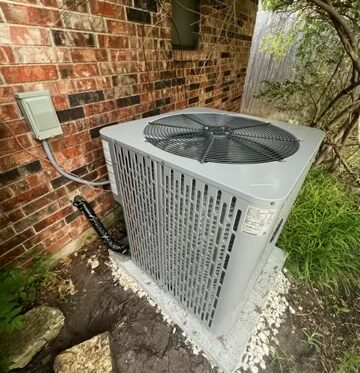In today’s world, energy efficiency has become a pressing concern for households. Escalating energy costs and the environmental impact of excessive consumption have prompted homeowners to seek ways to reduce their energy usage. One major contributor to a household’s energy consumption is the HVAC system. Let’s discuss the factors that contribute to energy efficiency in HVAC systems and highlight how these factors can lead to significant cost savings for homeowners.
The Role of HVAC Systems in Energy Consumption
Heating, ventilation, and air conditioning (HVAC) systems are the backbone of indoor comfort. However, they also account for a substantial portion of a household’s energy usage. In fact, HVAC systems are often the largest energy consumers in homes, especially during extreme weather conditions. Their dual functionality of maintaining optimal indoor temperatures year-round adds to their energy consumption. Therefore, any improvements in the energy efficiency of these systems can have a notable impact on reducing overall energy costs.
Factors Contributing to Energy Efficiency
Several critical factors contribute to the energy efficiency of a new HVAC system. These factors determine how effectively the system converts energy input into desirable indoor conditions, all while minimizing wastage. Understanding these factors is crucial for homeowners looking to make informed decisions about their HVAC systems.
1. SEER Rating (Seasonal Energy Efficiency Ratio)
The SEER rating measures the cooling efficiency of air conditioning systems. A higher SEER rating signifies better energy efficiency. Modern systems with higher SEER ratings use less energy to provide the same level of cooling, resulting in lower electricity bills. Investing in a system with a higher SEER rating can lead to substantial savings over the system’s lifespan.
2. AFUE Rating (Annual Fuel Utilization Efficiency)
For heating systems, the AFUE rating is a crucial indicator of energy efficiency. It measures how efficiently a furnace converts fuel into heat. A higher AFUE rating indicates less energy waste and more efficient heating. Upgrading to a furnace with a higher AFUE rating can result in reduced energy consumption and lower heating costs.
3. Energy-Star Certification
Energy-Star certified HVAC systems meet stringent energy efficiency standards the Environmental Protection Agency (EPA) set. These systems undergo rigorous testing to consume less energy without compromising performance. Choosing an Energy-Star certified system ensures that homeowners are investing in a product designed to deliver substantial energy savings.
4. Advanced Technology
Technological advancements have revolutionized HVAC systems. Variable-speed motors, for instance, allow systems to operate at varying speeds, adjusting energy consumption to meet actual cooling or heating demands. Smart thermostats enable precise temperature control and programming, reducing unnecessary energy use when occupants are away. These technologies optimize energy consumption and enhance cost savings.
5. Proper Sizing and Installation
An often-overlooked factor in energy efficiency is proper sizing and professional installation of HVAC systems. A system that’s too large or too small for a space can lead to inefficient operation and increased energy usage. Professional installation ensures the system operates at peak efficiency, maximizing energy savings.
Benefits of Upgrading to an Energy-Efficient HVAC System
Upgrading to an energy-efficient HVAC system offers numerous benefits beyond just financial savings. Homeowners can enjoy improved comfort, reduced environmental impact, and enhanced long-term savings.
1. Lower Energy Bills
The most immediate benefit of upgrading to an energy-efficient HVAC system is lower energy bills. Energy-efficient systems consume less electricity or fuel to achieve the same comfort level. Over time, these savings accumulate, significantly reducing monthly utility expenses.
2. Environmental Impact
Decreased energy consumption directly translates to a reduced carbon footprint. Energy-efficient HVAC systems contribute to mitigating climate change by lowering greenhouse gas emissions. By choosing such systems, homeowners play an active role in conserving natural resources and promoting environmental sustainability.
3. Long-Term Savings
While the initial investment in an energy-efficient HVAC system might be slightly higher, the long-term savings far outweigh the upfront costs. The reduced energy consumption leads to lower operational expenses over the system’s life, resulting in substantial savings.
4. Improved Comfort
Energy-efficient HVAC systems often provide superior comfort. They can maintain consistent temperatures, eliminate hot and cold spots, and offer better humidity control. Advanced technologies like variable-speed motors and smart thermostats contribute to more precise and effective temperature regulation.
Contact Professionals Today!
Are you ready to transform your living or working space into the epitome of comfort and energy efficiency? Look no further than Texas Pride Heating & Air! With our top-notch cooling, heating, insulation, and ventilation services, we are committed to creating environments that are perfectly tailored to your needs.
Whether it’s beating the scorching heat with our advanced cooling solutions, staying cozy during chilly winters with our impeccable heating systems, enhancing energy efficiency through premium insulation, or ensuring a breath of fresh air with our ventilation expertise, we’ve got you covered. Serving Keller and its surrounding areas, Texas Pride Heating & Air is your dedicated partner in achieving ultimate indoor bliss. Call Texas Pride Heating & Air today to schedule a consultation.








